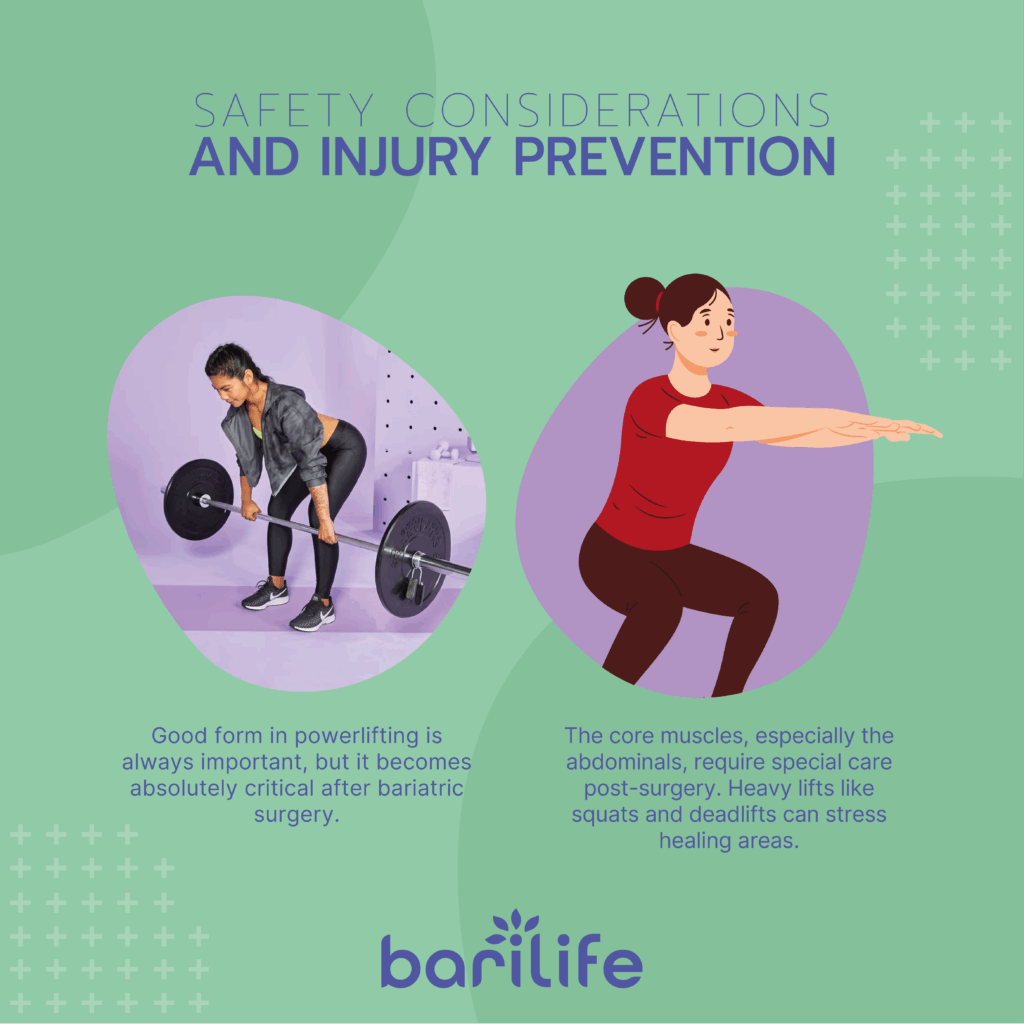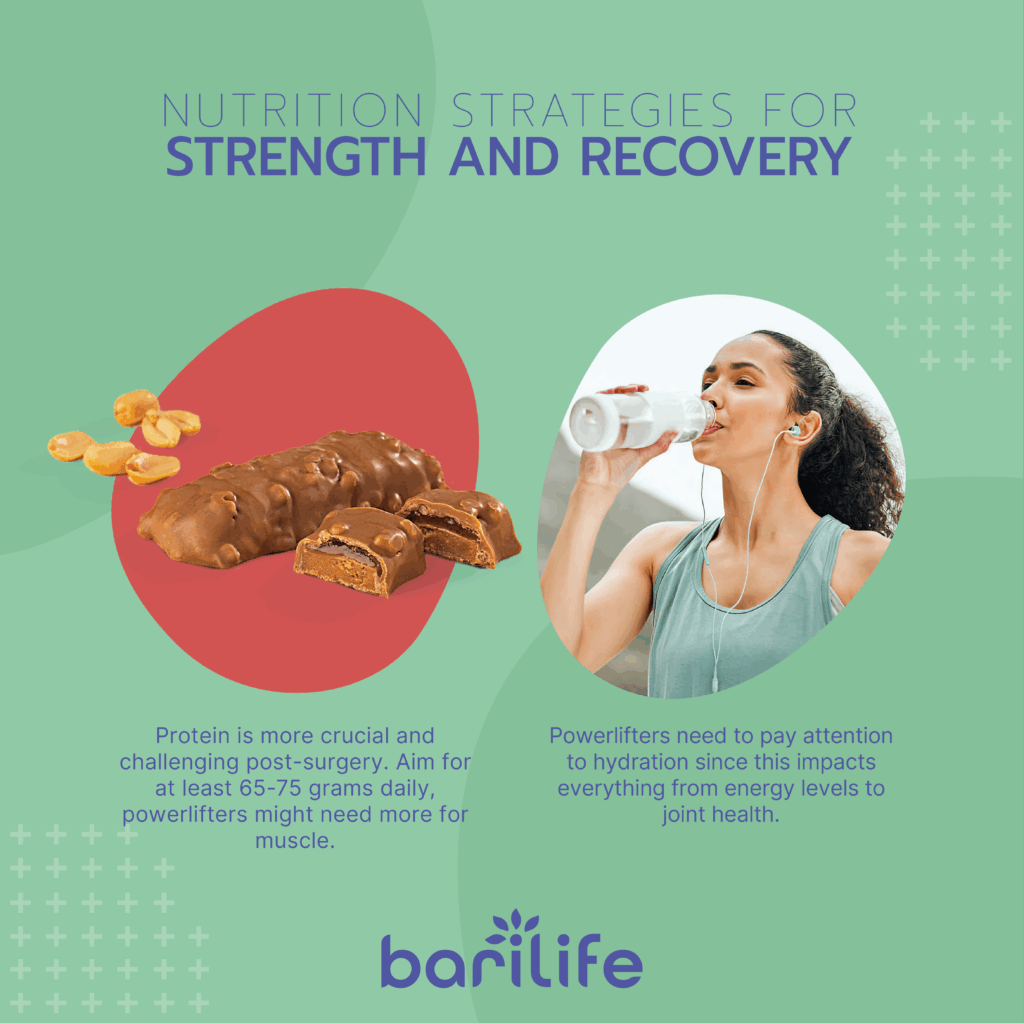Key Takeaways
- Powerlifting after bariatric surgery is achievable with proper medical clearance and a gradual approach.
- Nutritional planning with an emphasis on protein intake and hydration is essential for regaining strength after surgery.
- With patience and proper training, many patients exceed their pre-surgery strength levels at a healthier body weight.
If you've recently undergone bariatric surgery and you’re wondering whether you can get back to powerlifting—or perhaps you’re getting into it for the first time—you're not alone. Many individuals who’ve undergone weight loss surgery are passionate about fitness and worry about how their new digestive system may affect their strength training goals.
Powerlifting after bariatric surgery is definitely possible. However, it requires patience, proper planning, and a different approach than you might have used before surgery. It also requires a focus on how to build muscle after bariatric surgery by combining optimal nutrition and resistance-based exercise after bariatric surgery.
This article walks you through everything you need to know about safely returning to or beginning a powerlifting journey after bariatric surgery, as part of building your best possible life after bariatric surgery.
[/box]
The Recovery Phase: When Can You Start Powerlifting?

The journey back to the weight room begins with giving your body enough time to heal. Bariatric surgery is a major procedure that significantly changes your digestive system, so you need to take a thoughtful approach to returning to fitness.
Consult Your Surgeon
The most important first step is getting clearance from your medical team. No article on the internet—including this one—can replace personalized medical advice.
These professionals will evaluate how you're healing before giving you the green light for any heavy lifting. The assessment usually happens during follow-up appointments scheduled at the four to six-week mark after surgery.
Gradual Introduction
Even with medical clearance, jumping straight back into heavy squats, deadlifts, and bench presses isn't ideal. Weight lifting after bariatric surgery should be approached with caution. Medical guidelines suggest:
- Weeks 1-4: Focus on walking and very light movement
- Weeks 4-8: Begin bodyweight exercises and light resistance training
- Weeks 8-12: Start incorporating heavier weights
- After 3-4 months: Consider returning to a modified powerlifting program
Rushing back too quickly can slow down healing and potentially lead to complications in your surgical site, especially with movements that increase abdominal pressure.
Physiological Changes and Their Impact on Powerlifting
Understanding how your body has changed after surgery will help you set realistic expectations for your powerlifting journey.
Nutrient Absorption
Depending on which bariatric procedure you had, your body's ability to absorb certain nutrients may be reduced. This is particularly relevant for powerlifters because several key nutrients affect performance:
- Protein: Essential for muscle repair and growth
- Iron: Critical for oxygen transport during exercise
- B vitamins: Important for energy production
- Calcium and vitamin D: Necessary for bone health and muscle function
Research published in The American Journal of Clinical Nutrition shows that Roux-en-Y gastric bypass patients showed reduced absorption of several nutrients even a year after surgery. This doesn't mean you can't build strength. It just means you need to be more strategic about your nutrition.

Muscle Mass
The rapid weight loss that comes after bariatric surgery often includes some muscle mass reduction. This is a normal part of the process, but it can affect your initial strength levels when you return to lifting.
This isn't permanent, though. With proper training and nutrition, you can rebuild and even surpass your previous strength levels. It just takes time.
Strength Training Progression Post-Surgery
Smart progression is the key to successful powerlifting after bariatric surgery. Rushing the process won't get you stronger faster; it will only increase your risk of setbacks. Taking a methodical approach means you respect your body’s healing process.
Start with Bodyweight Exercises
Before loading a barbell, make sure you can control your own body weight through fundamental movement patterns:
- Squats: Air squats, then goblet squats
- Hinges: Bridges, then Romanian deadlifts with light weight
- Pushing movements: Wall pushes, then push-ups with modifications
- Pulling movements: Seated rows with resistance bands
These movements build the foundation for the three powerlifting movements—squats, bench press, and deadlifts—while being gentle on your healing body. They also help with toning exercises after bariatric surgery, essential for early-stage strength rebuilding.
Structured Routine
Once you're ready to incorporate more traditional powerlifting training, consider this modified approach:
- Train 2-3 days per week initially
- Keep sessions under 60 minutes to avoid fatigue
- Start with 50-60% of your pre-surgery weights or establish new baselines if you're new to powerlifting
- Use higher rep ranges (8-12) before progressing to the lower rep ranges
- Include both resistance training and some cardiovascular work for heart health
Safety Considerations and Injury Prevention
Safety is even more important after bariatric surgery, as your body is still adapting to significant changes.
Emphasize Proper Form
Good technique is always important in powerlifting, but it becomes absolutely essential after bariatric surgery. Poor form not only limits strength gains but can put dangerous pressure on healing tissues.

Working with a qualified coach, at least initially, is highly recommended. Having expert eyes on your technique can prevent complications that might set your progress back by months.
You can also record your lifts and review them, or work with a coach who has experience with bariatric patients. Many certified strength and conditioning specialists have specific training in working with clients with medical considerations.
Avoid Core Strain Initially
The core muscles, particularly the abdominals, need special attention after bariatric surgery. Heavy compound lifts like squats and deadlifts create significant intra-abdominal pressure, which can stress healing tissues.
For the first few months, consider these modifications:
- Use breathing techniques that reduce pressure, so avoid holding your breath or forceful "bracing"
- Wear appropriate supportive gear as recommended by your healthcare provider
- Consider alternative exercises that achieve similar benefits with less strain on your core
- Build core strength gradually with specific rehabilitation exercises
Nutrition Strategies for Strength and Recovery
No aspect of post-bariatric powerlifting is more important than nutrition. Your new digestive system requires a different approach to fueling your workouts and recovery.
Protein Intake
Protein is both more important and more challenging after bariatric surgery. Most programs recommend that you consume 65-75 grams of protein daily at minimum, but powerlifters may need more to support muscle repair and growth. The challenge is getting enough protein when you can only eat small volumes. This is where protein quality becomes crucial.
Focus on easily digested, high-quality proteins like:
- Whey protein isolate
- Egg whites
- Greek yogurt
- Lean fish
- Poultry
- Well-cooked legumes
Instead of trying to consume large amounts at once, spread your protein consumption throughout the day to accommodate your new stomach.
Hydration
Powerlifters need to pay attention to hydration since this impacts everything from energy levels to joint health. After bariatric surgery, you'll need to:

- Sip water continuously throughout the day
- Do not drink liquids 30 minutes before and after meals
- Try to go for at least 64 ounces (1.9 liters) daily, and more on training days
- Consider sugar-free electrolyte supplements, especially during intense training
Dehydration is one of the most common issues in post-bariatric athletes. It can cause fatigue, poor performance, and even increased risk of kidney stones, which, unfortunately, are more common after some bariatric procedures.
Mental and Emotional Aspects of Powerlifting Post-Surgery
The physical changes from bariatric surgery are significant, but the psychological adjustments can be equally challenging for powerlifters.
Body Image Adjustments
Your relationship with your body will likely change after surgery. For some, this is overwhelmingly positive—finally feeling strong and capable. For others, there's a period of adjustment to your new body and capabilities.
Many competitive lifters struggle initially with defining their identity. If you've always been "the big strong person," temporarily feeling weaker can be difficult emotionally. Redefining success as a strength-to-weight ratio rather than absolute numbers can help you appreciate how much stronger you're becoming relative to your new body weight.
Be patient with yourself and recognize that your body is going through an extraordinary transformation. Setting process-oriented goals, like perfecting technique or consistent training instead of just outcome goals, like achieving a specific weight, can help during this transition.
Seek Support
The powerlifting community can be incredibly supportive, but finding people who understand your journey can make a huge difference.
Consider doing these:
- Joining online groups for bariatric athletes
- Working with a trainer who has experience with post-surgical clients
- Being open with training partners about your needs and limitations
- Speaking with a mental health professional who focuses on body image and significant life changes

Finding other powerlifters who have gone through the same surgery as you can provide valuable insights and motivation. When you see others compete at a high level after bariatric surgery, it can give you confidence to get back to the sport you love.
Conclusion: Yes, You Can Powerlift After Bariatric Surgery
The journey back to powerlifting after bariatric surgery requires patience and attention to your body's changing needs. With the right approach, you may eventually exceed your pre-surgery strength levels.
Just know that your worth as an athlete isn't defined by how quickly you return to heavy lifting or what numbers you hit. The discipline, persistence, and courage that led you to make a life-changing decision about your health are the same qualities that make successful powerlifters.
By respecting your body's healing process, working closely with healthcare providers, and taking a gradual approach to regaining strength, you can safely enjoy the sport and all the physical and mental benefits it offers.
How Bari Life Can Help
Nutrition is essential for powerlifters after bariatric surgery. At Bari Life, we understand that maintaining strength and recovery post-surgery requires precise nutritional support. That’s why we offer a full range of supplements, including bariatric multivitamins, bariatric protein shakes, and bariatric vitamins chewable—all designed to meet your body’s evolving needs.
Whether you're looking to boost energy, support muscle recovery, or prevent deficiencies, our bariatric vitamins provide comprehensive support. For those who prefer variety, we also o

Leave a Comment
Your email address will not be published.